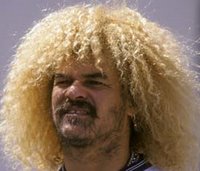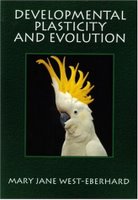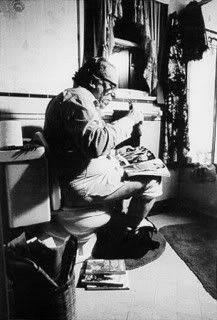Neandertals Hunted as Well as Humans
I just love this headline from National Geographic.
Neandertals Hunted as Well as Humans, Study Says
It just got me thinking I have had this blog up all weekend now and have yet to post on Neandertals. Gotta fix that.
The title of NG's article first struck me as kind of weird- the inference I made was the Neandertals were being AS hunted as well as the humans- you know, something was eatting EVERYONE back in the Middle to Late Pleistocene!
It turns out the story is based on an article in Current Anthropology that examines Neandertal hunting techniques and technology in parts of Western Asia.
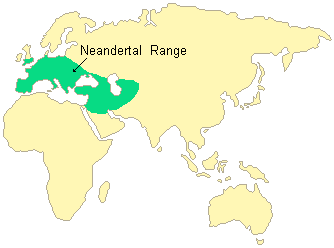
The authors of the article compare the result of types of animals, quantities of animals hunted, ranges, etc. and noticed that what the Neandertals were doing in regards hunting was just as good as the "modern" humans that supposedly replaced them.
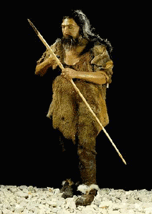
In fact, they determined that even the vaunted technological differences between Neandertals and later humans that, for many years, has been trumpeted as THE significant difference, as it represented differences in intellectual capabilities between the two groups, was unimportant from a hunting standpoint-the Neandertals technology was just as capable and proficient for hunting what they were hunting as the later technologies were. So, then, Neandertals were hunting the same foods in the same quantities using tools that were as efficient as later humans- hmm, seems to be little difference there. So what was the supposed "edge" that "modern" humans used to completely replace he Neandertals with? Why should they be considered different enough to classify them as a separate species?
Well, even the authors of this research admit this isn't really valid based on their work, so do they suggest we reconsider Neandertals as "outside the pale" of modern humanity? By God, NO! They suggest some other vague "behavioral" differences that haven't yet been proven to mean anything important (kinda like the previous thinking about differences in hunting proficiencies).
Once again we have this paradigm problem in science. Like Eldridge and Gould wrote (see Exogenic Inanities Anyone? post), we see in the evidence what we expect to see. Neandertals have been outside the human family tree, scientifically, for 150 years now, so we can't think of them otherwise, despite the facts. And its all because of the damn French!
Marcellin Boule, the renowned French anatomist/scientist/polyglot decided, after looking at a single Neandertal specimen, that they could not have been part of our lineage-problem was, he only looked at an old arthritic individual (the so-called "Old Man of La'Chapelle"). Boule set in motion the idea that Neandertals were beast-like decrepits that were in no way ancestral to the beautiful European modern people.


Boule's interpretation of Neandertals became the paradigm through which, not just the public views, as in these early images derived with Boule's assistance, but the way in which science understood them as well.
That paradigm has been a powerful one to get past. But, as Thomas Kuhn predicted in his seminal work, Structures of Scientific Revolutions, the inadequacies of the established paradigm have been becoming more and more manifest. That being the case, though, as in the article the NG story is based on, the scientists working comfortably in their pre-existing concept of what the facts should say soldier on in generating their new hypotheses based on that old world-view.
But the tide has slowly been changing recently. Newer, often younger, scientists have been looking more closely at the evidence the Neandertals have left us and realizing that many of the old paradigms just don't work. In many ways, Neandertals have been becoming more human.


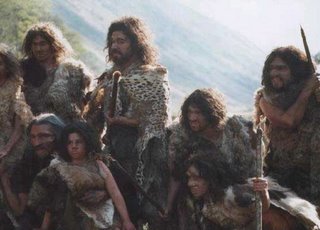
Its about time. The earliest interpretations of Neandertals are ridiculously conceived and deserve to be retired. Now its time to retire those scientific paradigms that insist on thinking in terms of Neandertals as the 'others.'
In the end, all of these paradigms and interpretations tell us more about ourselves than they have ever told us about Neandertals, anyway.
Neandertals Hunted as Well as Humans, Study Says
It just got me thinking I have had this blog up all weekend now and have yet to post on Neandertals. Gotta fix that.
The title of NG's article first struck me as kind of weird- the inference I made was the Neandertals were being AS hunted as well as the humans- you know, something was eatting EVERYONE back in the Middle to Late Pleistocene!
It turns out the story is based on an article in Current Anthropology that examines Neandertal hunting techniques and technology in parts of Western Asia.

The authors of the article compare the result of types of animals, quantities of animals hunted, ranges, etc. and noticed that what the Neandertals were doing in regards hunting was just as good as the "modern" humans that supposedly replaced them.

In fact, they determined that even the vaunted technological differences between Neandertals and later humans that, for many years, has been trumpeted as THE significant difference, as it represented differences in intellectual capabilities between the two groups, was unimportant from a hunting standpoint-the Neandertals technology was just as capable and proficient for hunting what they were hunting as the later technologies were. So, then, Neandertals were hunting the same foods in the same quantities using tools that were as efficient as later humans- hmm, seems to be little difference there. So what was the supposed "edge" that "modern" humans used to completely replace he Neandertals with? Why should they be considered different enough to classify them as a separate species?
Well, even the authors of this research admit this isn't really valid based on their work, so do they suggest we reconsider Neandertals as "outside the pale" of modern humanity? By God, NO! They suggest some other vague "behavioral" differences that haven't yet been proven to mean anything important (kinda like the previous thinking about differences in hunting proficiencies).
Once again we have this paradigm problem in science. Like Eldridge and Gould wrote (see Exogenic Inanities Anyone? post), we see in the evidence what we expect to see. Neandertals have been outside the human family tree, scientifically, for 150 years now, so we can't think of them otherwise, despite the facts. And its all because of the damn French!
Marcellin Boule, the renowned French anatomist/scientist/polyglot decided, after looking at a single Neandertal specimen, that they could not have been part of our lineage-problem was, he only looked at an old arthritic individual (the so-called "Old Man of La'Chapelle"). Boule set in motion the idea that Neandertals were beast-like decrepits that were in no way ancestral to the beautiful European modern people.


Boule's interpretation of Neandertals became the paradigm through which, not just the public views, as in these early images derived with Boule's assistance, but the way in which science understood them as well.
That paradigm has been a powerful one to get past. But, as Thomas Kuhn predicted in his seminal work, Structures of Scientific Revolutions, the inadequacies of the established paradigm have been becoming more and more manifest. That being the case, though, as in the article the NG story is based on, the scientists working comfortably in their pre-existing concept of what the facts should say soldier on in generating their new hypotheses based on that old world-view.
But the tide has slowly been changing recently. Newer, often younger, scientists have been looking more closely at the evidence the Neandertals have left us and realizing that many of the old paradigms just don't work. In many ways, Neandertals have been becoming more human.



Its about time. The earliest interpretations of Neandertals are ridiculously conceived and deserve to be retired. Now its time to retire those scientific paradigms that insist on thinking in terms of Neandertals as the 'others.'
In the end, all of these paradigms and interpretations tell us more about ourselves than they have ever told us about Neandertals, anyway.



